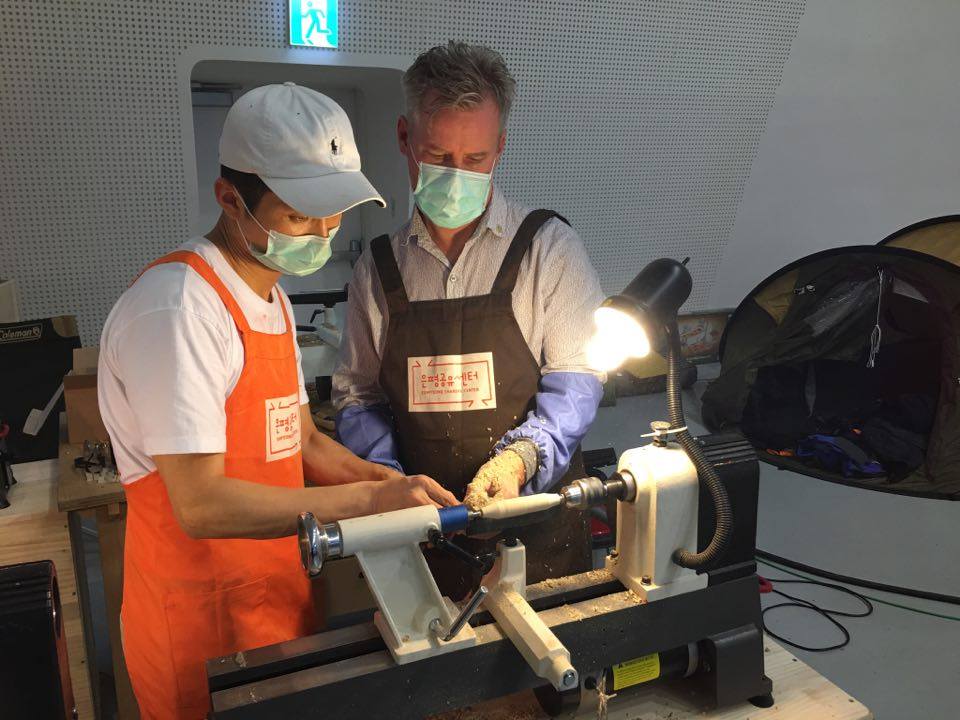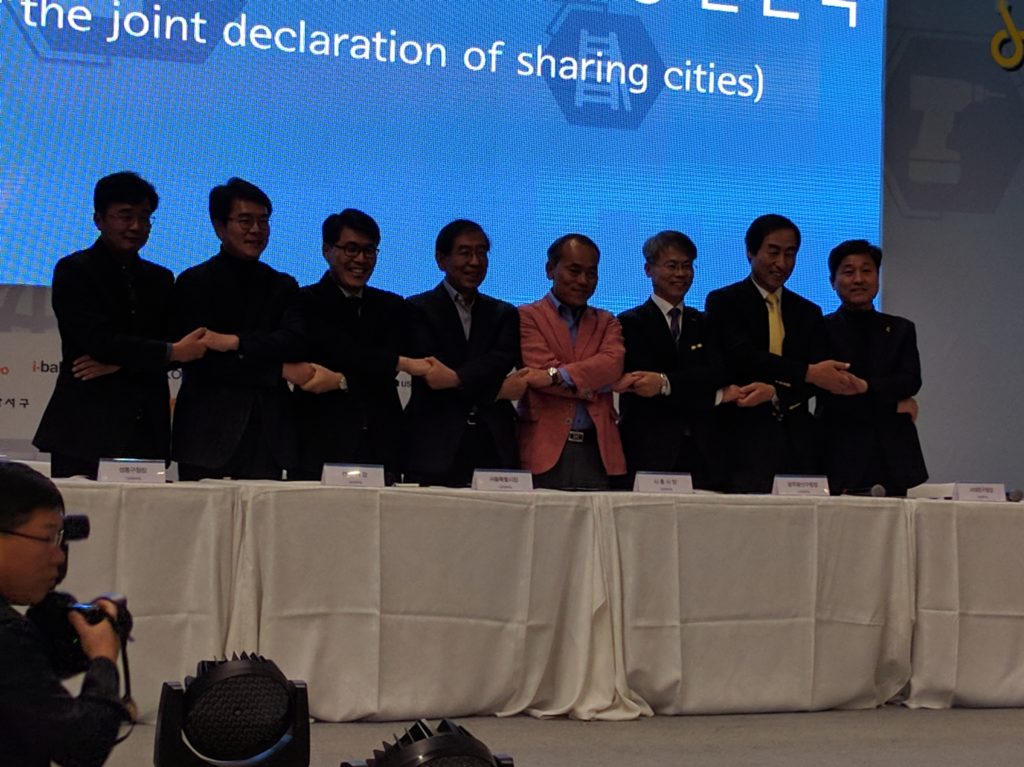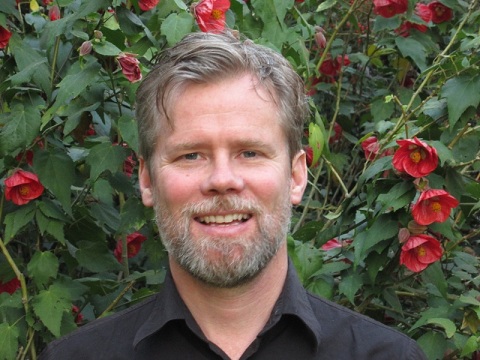Seoul’s Mayor Park Won-soon, fourth from left, hand-in-hand with seven other mayors after signing joint declaration to develop sharing cities together.
In the opening ceremony of Seoul’s two-day, annual Sharing Festival at Dongdaemon Design Plaza on November 6, Mayor Park Won-soon signed a joint declaration with the mayors of other Korean cities — including Jeonju, Suwon, Seongnam, Siheung, Gwangju, and Don-gu — to develop their sharing cities together. The ceremony marked the fourth anniversary of the launch of Mayor Park’s groundbreaking sharing city program, its considerable progress and influence around the world, and the relevance of sharing to Korea society and cities in general.
In his opening remarks, Mayor Park emphasized cities’ function as platforms for sharing and the central role citizen’s play in making the city. He acknowledged his recent win of the Gothenburg Award for his work on Seoul, Sharing City, but attributed its success to the citizens of Seoul who’ve made it happen. He quoted Jeremy Rifkin who said that Koreans work in a capitalist economy during the day, but come home to a sharing economy at night. Mayor Park said that he sees sharing as compatible with Korean culture but also compatible, complementary, and convergent with capitalism. A sharing economy is an alternative but also consistent with a market economy and also opens new worlds.
After the mayor of each city gave a short statement of support for the multi-city collaboration, they signed the joint declaration, and then rose to stand hand-in-hand crosswise – imitating the logo of the festival — across the stage in a show of solidarity.

What followed were two days of sharing cities talks from a local and global representatives and an exhibition featuring Seoul’s top sharing enterprises. The conference talks explored sharing as a solution to urban problems and the advantages of the sharing economy. Speakers from Seoul and around the world filled out the program.
Highlights of the conference talks included:
- Jeong-hwa Pan of The Seoul Institute gave a progress report on sharing in Seoul. Some numbers stood out including 10x growth in carsharing, 80% awareness of carsharing and bikesharing, and 5x growth in sharing transactions in a cluster of companies that help people share clothes, experiences, space, and skills. The number of sharing enterprises has also nearly doubled to 70 from 37 since the start of Seoul, Sharing City in 2012.
- A representative of Eunpyeong, one of Seoul’s 25 districts, gave a progress report on their efforts to promote sharing. District level promotion is an essential part of Mayor Park’s strategy to promote sharing in Seoul, so it was good to get a view from the trenches. Carsharing and Eunpyeong Sharing Center stood out as successes. The Sharing Center is a combination of maker space, coworking, and training facility. It’s quite popular in the district. Additional locations are being considered. An interesting innovation was the Tool Library Box, a portable tool library. Success seemed mixed and progress slow but steady where sharing is catching on.
- Global sharing city trends were reported by Christian Iaione (Labgov, Italy), Femke Haccou and Femke Blokhuis (city government of Amsterdam), Pieter van de Glind (ShareNL, Amsterdam) Tracy Cook (city government of Toronto), Matsuda Shogo (government of Japan), April Rinne and myself (U.S.), Harald Heinrichs (Leuphana University, Germany), Andreas Aditya Swasti (Nebengers, long-distance ridesharing, Indonesia), Alex Stephany (JustPark, U.K.), Daitsuke Sikematsu (Sharing Economy Association of Japan and Spacemarket), and Guilliaume Lavoie (city council of Montreal). While each place had its own approach to sharing, the various reports showed that sharing is being adopted and adapted in many different ways according to varying needs, culture, and laws of each locality. That said, a consistent theme was how to regulate Airbnb and Uber. Cities are still struggling with that though there seemed to be a consensus among speakers about how to do it – after a thorough period of evaluation and public discussion, allow them to operate under certain conditions that offer the most benefit to all stakeholders, with emphasis on how ordinary citizens benefit. This could translate into various schemes depending on the specific situation of each city. So for instance, where cab service is good like in Seoul, then limit Uber to offering black car service. Where it isn’t so good, use Uber to augment taxis and / or spur innovation in taxi service as in the case of Toronto or just allow them in areas of a city where taxi service is lacking.
- Pieter van de Glind of ShareNL and Sharing City Amsterdam framed his talk about sharing cities using the fourth industrial revolution, which is what comes after the steam, electrical and digital revolutions. It’s a cyber-physical revolution with a collection of technologies – such as artificial intelligence, blockchain, and self-driving cars – that promise to drive a deeper, broader, and more rapid change than prior revolutions. He likened technology to hammer. It can be used to build or kill. The implication is that this goes even more so for the fourth industrial revolution. It presents a great opportunity, but only if shaped for the benefit of ordinary people through things like sharing cities. His talk put the sharing economy in context of a larger technological shift.
- Daisuke Shigematsu, chairman of the Sharing Economy Association of Japan (SEAJ) and CEO of Spacemarket, the Airbnb of event spaces in Japan, gave a talk about the newly formed association and his company, which helps hosts find venues for events. Want to host a corporate party in a Shinto temple or a cosplay convention on an island? Search Spacemarket’s 10,000 venues for the right fit. The relevance of SEAJ to sharing cities is that it’s aggressively spreading the sharing city phenomenon in Japan. They hosted the first Japanese sharing cities event in Fukuoka this past September. Over 1,000 people attended. They are also working with Chiba, Hamamatsu, Shimabara, Taku, and Yuzawa. Their strategy is to spread sharing cities in smaller Japanese cities before introducing it to larger ones. Along those lines, they are hosting their first conference, the Share!Summit, on November 24-25th. Officials from 10 city governments will be in attendance. SEAJ’s goal is to introduce sharing cities to 50 Japanese cities by the end of 2017. In addition to an energetic chairman and staff, SEAJ benefits from the blogging skills of Anju Ishiyama, known as “the sharing girl” for her popular sharing lifestyle blog on CNET Japan.
The talks were held alongside an exhibition that featured dozens of Seoul-based sharing enterprises including SOCAR (carsharing), i-baby (used kids clothing marketplace), Kozaza (homestays in traditional Korean hanok houses), 7 Pictures (matches artists with exhibit spaces), Share-US (shared living spaces for young people), and more. Perhaps uniquely Korean is The Open Closet, a nonprofit that rents formal clothing. Young adults make up 70% of their earned income. In Korea, you must wear a suit to a job interview even if the day-to-day job doesn’t require wearing a suit. They’ve served 30,000 people, keep very busy, and are planning to expand. Eunpyeong Sharing Center’s booth also stood out. It included a maker space where you could make wooden pens, all with the help of an expert lathe operator. I made one in about 15 minutes (with a lot of help). It was a relief to make something with my hands after a two-day cerebral workout across oceans and cultures.










